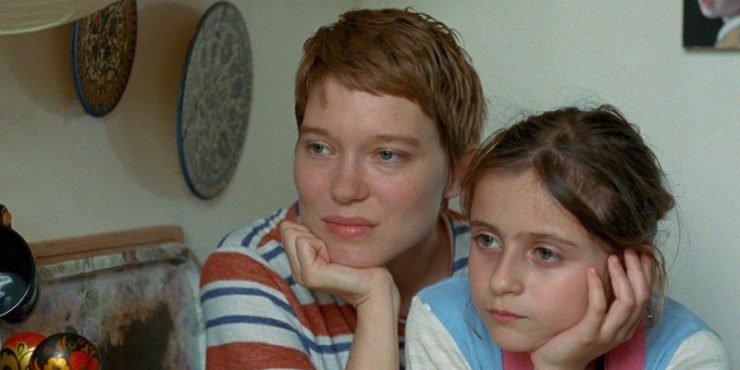Mia Hansen-Løve has made no secret about the autobiographical nature of her films. If anything, it seems to be a point of pride. Her films have a kind of frank, episodic nature that might remind you of Eric Rohmer, without the reductive character psychology. One Fine Morning, about a Parisian translator, is another addition to the Mia Hansen-Løve auto-fictional cinematic universe, dwelling in the practicalities of life and how they entangle themselves in our more dire dramas. Léa Seydoux plays Sandra, a widow and single mother. Throughout the film she balances her work with an ailing parent, a petulant child, and a torrid affair with a married man. These parallel narratives highlight her selflessness as well as her vanity, giving herself totally to some while demanding the world from others.
Seydoux, a superb actress with an impressive resume at only thirty-seven, gets her most subdued role in years. Her striking beauty and dry delivery has made her a popular choice for severe dignitaries like the ruthless television journalist in France or the steely Loner Leader in The Lobster (her sharp features making her a prescient choice for satire). Hansen-Løve gives her a chance to return to a more naturalistic story and character. Sandra’s father, Georg (Pascal Greggory), is fading quickly with Benson’s Syndrome, which has caused his mind to atrophy. A cruel fate for a former philosophy professor whose main hobbies were that of thought. The father-daughter relationship is a close one – she visits him as often as she can – but as his condition worsens, it turns into a prolonged sequence of entries and exits through various facilities, trying hopelessly to find one that can keep him.
She does this with the help of her sister, Eloide (Sarah Le Picard), and her mother, Françoise (Nicole Garcia), who picks up the slack, even though she divorced from Georg decades before. Georg’s own concerns are mostly with Leila (Fejria Deliba), a younger woman who he’s been seeing the last few years. Seen sparingly in the film, Leila carries little of the responsibility for Georg, but she takes up a lot of his mental real estate, a fact that doesn’t go unnoticed by Sandra and everyone else. At home, Sandra is raising Linn (Camille Leban Martins), a precocious child whose close relationship with her mother is not without tension. Spread thin, Sandra can’t often give Linn the longer leash the young girl thinks she deserves. When she runs into an old friend, Clément (Melvil Poupaud), their reunion quickly blooms into an affair, complicated by his wife and son.
If Sandra is patient and collected with Georg, the rest of her life carries the burden of her emotional frailty. Speaking with one of Georg’s former students, she bursts into sobs simply trying to explain his condition. With Clément, she finds herself swept away by the passion, before becoming resentful of him for making her the other woman. As Clément visits more often, Linn watches with partial curiosity. She likes Clément, impressed by his career as a cosmo-chemist, which takes him around the world in search of the dust from outer space. As for Sandra, everything whirls around her, colliding worlds overwhelm and at times overcome. Her search for love from a father who can’t understand and a lover who can’t commit leaves her empty-handed, with a sorrow she can hardly bear.
Hansen-Løve is a master at these types of melancholy character studies, particularly about women who find themselves preoccupied by impermissible desires. She eschews melodrama, focusing instead on understated moments. Her characters often speak plainly about their wants and loves, though at times they may wax poetic about a book or a record when they’re really exposing their feelings about another person. Despite this, her dialogue always has a light, natural quality to it, and the performances she directs almost always build slowly toward an emotional catharsis that erupts against the more muted events that have preceded it. There’s a moment where Sandra explains to Linn how people’s libraries can be a window into their soul. It’s a speech without sweeping certitudes and Seydoux delivers it without bombast, and it’s moments like these that make every Hansen-Løve film special.
I found myself wishing there were more moments like that throughout One Fine Morning. In Things to Come and her masterpiece, Bergman Island, Hansen-Løve perfected her template, crafting tales of women searching for more and finding satisfaction in the journey even if they didn’t get exactly what they wanted. Morning feels more like low-key Rohmer, too seduced by its emotional neutrality; a neutrality, mind you, that winds Sandra’s affair with Clément into a surprisingly standard spurned-lover plot while mostly ignoring the major complication of his wife and child. Many would argue that Morning is meant to be completely from Sandra’s point-of-view – and Seydoux’s excellent work definitely justifies giving her said responsibility – but its a disappointingly drab plot line that weakens an otherwise solid slice-of-life drama.
Written and Directed by Mia Hansen-Løve










